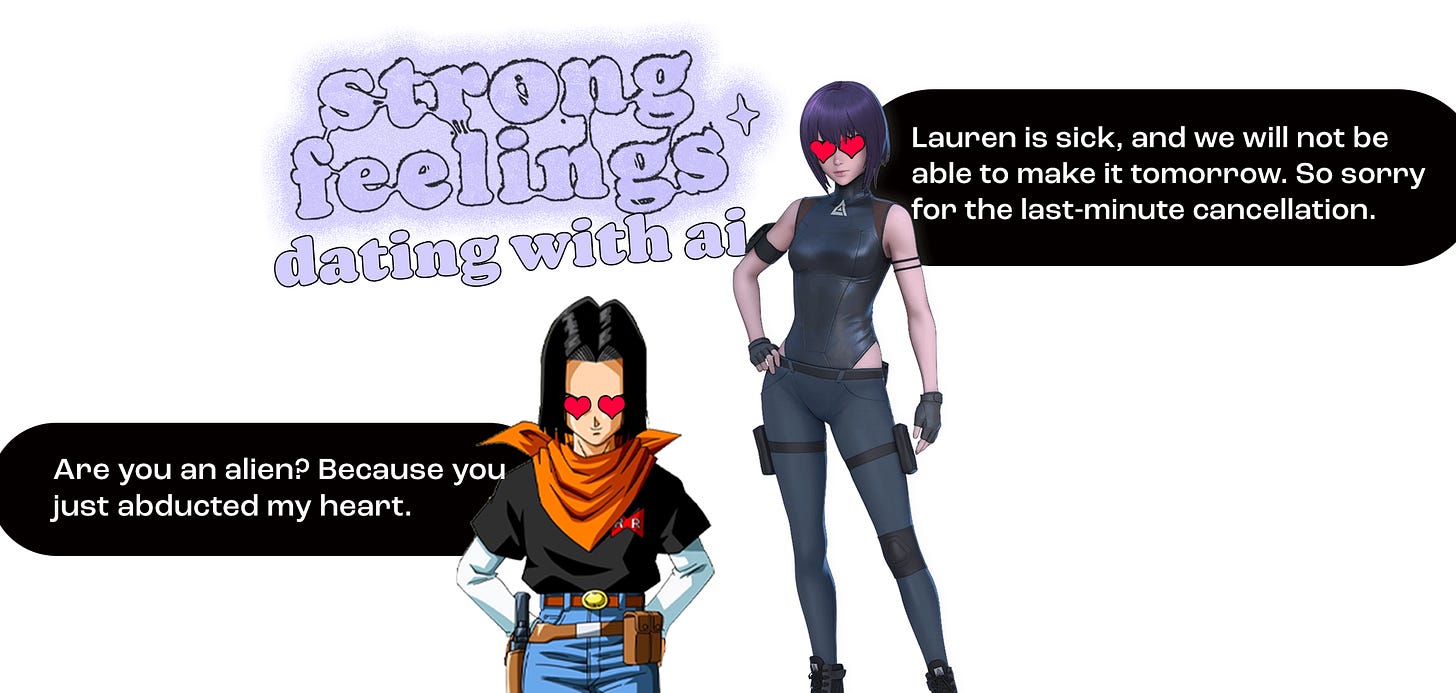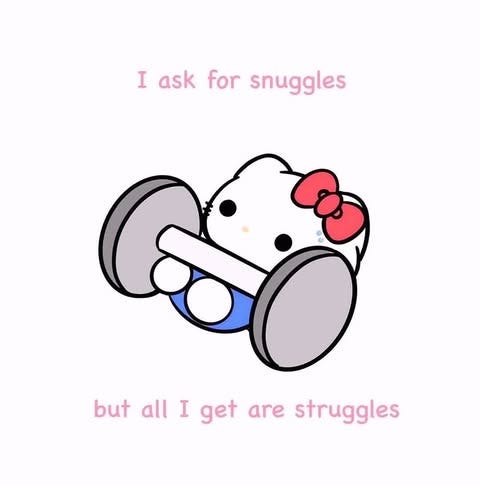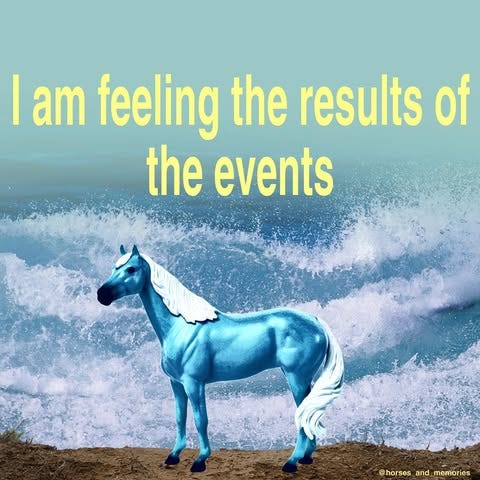is AI dating the new frontier of impersonal connection?
welcome to strong feelings! Essays by writers we love, in which they share their most impassioned opinions on a given subject. In today’s strong feelings, writer Jillian Angelini explores the good, the bad, and the ugly of dating with AI.
Brian Fitzpatrick, a single 27-year-old engineer in Queens, was doing everything you're told to do while online dating. He was on every app, swiping constantly, and sending message after message. Yet, despite the efforts, he barely got any dates, making him feel beyond frustrated. After a situationship with someone he met on an app fizzled out, he realized he wasn't dating enough "high-quality women," as he called it. His solution? Turn to AI for help.
Artificial Intelligence has been quietly embedding itself into the dating world for years, promising to make connection easier for users. From AI-powered apps to chatbots that help you craft better bios, suggest pickup lines, and even act as temporary companions, its presence is becoming almost impossible to ignore. AI isn't just an option for anyone using a dating app today — it's unavoidable. Major platforms like Tinder, Bumble, Hinge, and Grindr have rolled out AI-driven features, with even more expected in the near future.
In a recent study, Bumble found that 46% of women expressed anxiety over the authenticity of their online matches on dating apps. So, they created a Deception Detector™, an AI algorithm to help identify spam, scams, and fake profiles and leave more room for real people looking for connections. Last year, Tinder released a Photo Selector tool to help users pick images for their dating profiles by selecting a selfie for facial recognition.
And this is just the start of modern dating's submission to AI. Bumble sees a future where they start implementing an AI concierge to coach users on how to have conversations. Tinder's CEO has said that the app is trying out other discovery features that would suggest people's matches based on pictures and quizzes.
Dating apps are trying it all, as they haven't exactly been winning people over lately. Users like Fitzpatrick are growing tired of algorithms that seem to lead to nowhere but frustration. Reports show that over 90% of Gen Z has felt “frustration” while using dating apps. It's no wonder the big dating apps are scrambling to pull people back into the cycle — doing anything to reassure users their next connection is right around the corner.
Beyond the major dating apps, new AI platforms are emerging to help users craft compelling responses and improve their dating skills. To help Fitzpatrick on his quest for love, he started using Your Move AI, a $60-a-year texting assistant, to refine his dating profile and respond to matches. "When women say certain things in their profile, I can't think up a creative response that'll allow for a reply. I'll use the AI to help craft responses, and that'll start the convo right up to going on a date," he explains. Your Move AI's website caters to users like Fitzpatrick, promising to help them spend less time stuck in the app and more time actually dating. Fitzpatrick isn’t the only one who has used this approach.
Dmitry Dalen, a salesman from San Diego, started using Rizz AI, a $20/month dating assistant, to help him craft responses to messages he didn't know how to respond to. He would use it as inspiration whenever he was stuck. With over 7.5 million users to date, Rizz helps its users level up their dating app messages by allowing users to upload a conversation screenshot or profile and get suggestions on what to say.
Dalen used Rizz once when a woman he had been talking to asked him, "How did you know I love pancakes?" Dalen turned to Rizz to find the response, "I guess I have a knack for picking up on sweet things." Surprise: They ended up going on a date to a brunch spot where they had pancakes.
Roman Khaves, founder and CEO of Rizz AI, says the company's goal is not to replace human connection but rather to help people get to their first date much faster. "You've probably heard people say things like, ‘Oh, he's such an amazing guy, but a bad texter.’ We're just trying to help those amazing guys get seen. That's our mission," he emphasizes. With 65% of users on Rizz being men and 35% women, it's clear that AI dating tools are particularly resonating with single men.
A drastic shift is happening in how people relate to each other in our digitized world, and it's deeply influencing how we date and connect. Society is facing a global loneliness epidemic, and people are struggling to build connections. AI-driven services are being marketed to make people stand out and overcome their isolation. However, with all the excitement around this shiny new technology, I can't help but question its limits. Are we being offered genuine ways to connect, or will these tools only serve to deepen our sense of detachment rather than foster real interpersonal bonds? I predict the latter, and I'm not the only one.
Journalist Rae Witte has reported on AI in the dating scene numerous times, most recently for Men's Health. Witte sees nothing even remotely redeeming about using it in any sense, noting that, in her own dating life, she'd be turned off by someone who was leveraging it. "From the reporting I've done in the dating space, most dating AI's are touted as a coach, wing person, or aid to make dating easier. I think this is purely preying on people who want a partner and haven't found one," she notes. "I think the use of AI will leave people further from themselves and subsequently more incapable of connecting with others." I find myself having to agree with Witte.
After testing Rizz's free website generator myself, I received the pickup line, "Are you an alien? Because you just abducted my heart." I would die of embarrassment if I sent that to someone — not just because it's cringy, but because it lacks even the slightest bit of personalization.
Curious about how AI would handle a real conversation, I decided to import a chat between my me, my partner, and another couple we had been planning to meet on Feeld. They had to cancel at the last minute because one of them got sick.
Their message read: "Lauren is sick, and we will not be able to make it tomorrow. So sorry for the last-minute cancellation. We would love to reschedule when we're all free."
Rizz suggested I reply with: "Oh no, sending good vibes her way! 🌟 Got any fun plans for when you can reschedule?"
Other than the fact that I'd never in my life say "sending good vibes" or that the AI incorrectly assumed Lauren's pronouns, there was nothing inherently wrong with the response, but it was generic. I personally wouldn't want to seek a connection with someone who can't come up with something that simple on their own.
After speaking to a handful of women, it’s clear the responses to AI are mixed. “When it comes to banter, I would literally hate it if a guy used a chatbot to talk to me,” said Aiyana, a 26-year-old writer in New York City. “If you can’t naturally think of something witty or cute or flirty to say to me then maybe we shouldn’t be talking.”
As a self-proclaimed “dry texter,” Madison, a 38-year-old colorist in New York City, disagrees. “I honestly wouldn’t mind if someone used an AI chatbot to write messages to me on an app because texting is not always the best foot forward for me. If you only go off my texting, you may never give me a chance to meet up in person,” she said. “I’m also the type of person who likes to meet up right away — not text for an eternity. Once we meet, I’ll know you in person.”
And then there are less cut-and-dry ways to use AI — like helping gather their words before a serious conversation. “I’ve used ChatGPT to organize my thoughts when talking to [someone I was dating],” Aiyana adds. “I wouldn’t feel a way about that because sometimes when it comes to difficult conversations it’s helpful to get a starting paragraph. I’d hope they wouldn’t send verbatim what Miss AI gave them though!”
And while there may be opportunities to use AI chatbots as a tool, I find it really hard to ignore the growing disconnect it's creating, especially given the huge amount of bias AI has. When I asked Rizz co-founder Daniel Khaves how the platform addresses pre-existing social biases, he assured me, "Rizz is used by everyone, regardless of orientation." He then followed up by highlighting how many users on Grindr were engaging with the app. It's obvious AI caters to men, intentionally or not.
So, what happens when the “bad texter” type of guy Khaves was talking about earlier shows up to the date? Is he just as bad at IRL conversation as he is texting? AI is synthetic and ignores the broader dynamics of connection and emotional intelligence. It has the potential to distort a person's identity — their responses and profile may not truly reflect their own thoughts or personality. That's scary.
Sexologist and dating expert Tim Lagman notes that all AI needs to be approached with caution and a grain of salt. "AI can help push us to become better daters, but it should not replace authentic human connection. While it can serve to inspire and influence us to present our best selves, it should not be a replacement for natural chemistry that can only be achieved through human experience. We need to be careful about being fully reliant on AI, especially in relationships that grow through resilience."
For both Fitzpatrick and Dalen, AI tools have boosted their confidence and significantly improved their chances of meeting women. "Between November 22nd and January 15th, I dated 15 different women, many of whom I wouldn't have been able to get a date with prior to the app," Dalen shares.
While AI isn't inherently bad, its benefits seem to be largely skewed to uphold patriarchal, heteronormative guidelines of courtship. As we progress toward AI tools becoming more mainstream, we must ask ourselves: Are they truly helping people connect, or are they only deepening the disconnect? Will layering shiny new technology into failing users of dating apps actually make a difference? It seems unlikely.
AI's new frontier is here, and it's not going anywhere. Unless you plan to opt out of dating apps completely, we will all be using it — whether we like it or not. Connection is clearly a significant struggle for humanity right now, and although we're being told AI is the solution, we must be wary of who it's really serving.
Witte tells me we all need more patience. She suggests that anyone turning to AI as a last resort for connection should first focus on understanding themselves. "Would you want to end up using an AI to talk to someone who's also using an AI to talk to you?" she asks. "I imagine the conversation, care for each other, and [the] sex would be terrible."






Texting really well is hard AF. Not saying AI is useless, but as a source of mid ideas when you've got nothing, it might be able to get you started. Like using an on-line source for a paper, paraphrase or better yet, fully re-write the output to be you. You can read quickly and rewrite right? Will you ever need to own up?
Fuck, what do I know?
But to really know how well it works, I'd need to actually sign up and I'm def not down with that.